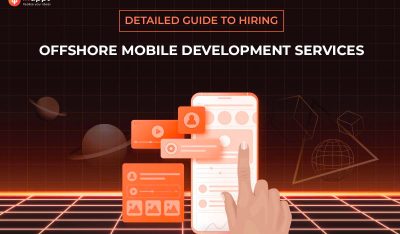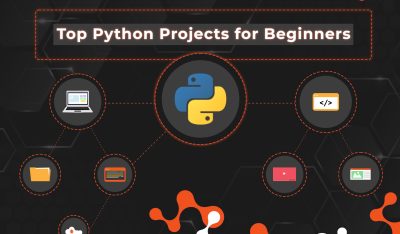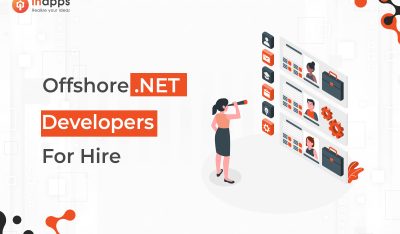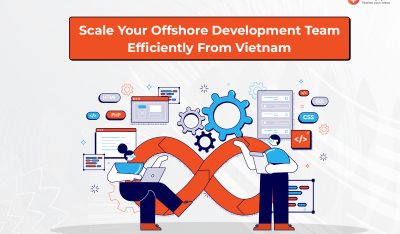- Home
- >
- Offshore Software Development Center
- >
- What Is ODC? Understand Offshore Development Center In 3 Seconds
In the modern business landscape, hiring an Offshore Development Center (ODC) has become crucial. The primary reason for this is that this model allows businesses across the globe to tap into global talent pools with reduced costs while staying competitive and agile in a rapidly evolving market.
Businesses with demand for ODC often see huge potential in extending their development capabilities, accessing specialized expertise, and leveraging diverse resources. All of which contribute to their prominence as a strategic business model.
In this article, we will explore what is an ODC as well as how to set up an offshore development center in another country. By only focusing on the necessary steps, this article will give you actionable knowledge to outsource an ODC team successfully.
1. What is ODC?
An Offshore Development Center (ODC) refers to a dedicated facility or team located in a different country or region from the parent company’s headquarters. This team or facility functions as an extension of the parent company’s IT or software development capabilities.
Hiring an ODC helps easily scale up or down tech talents from overseas and thus reduce expenses. By setting up an ODC in a region with a lower cost of living and competitive labor market, organizations can reduce their project execution costs without compromising on the quality of work. Moreover, ODCs give access to a pool of highly skilled professionals, so companies can tap into scarce specialized talent.
You can hire an ODC team to help you build mobile apps, web apps, enterprise apps, custom apps, and many other software development services. These companies are using a diverse range of tech stacks, like LAMP, MEAN, or MERN to carry out software development processes. The best tech stack for a project will depend on the requirements of that project. While LAMP is popular for web development, the MEAN and MERN stacks are trending for single-page web applications.
LAMP: Linux, Apache, MySQL, and PHP
MEAN: MongoDB-Express-Angular-Node.js
MEARN: MongoDB, Express.js, React, and Node.js. Similar to MEAN, but uses React instead of Angular.
Normally, offshore development center team includes a project manager whose job is to coordinate tasks, set project goals, track progress, and ensure that deliverables align with the parent company’s objectives. ODC team structure can vary depending on the company and project requirements. The typical roles include project managers, team leaders, software engineers, developers, quality assurance (QA) experts, UI/UX designers, and other administrative positions.
Here are the specific tasks each team members are responsible for while managing operations:
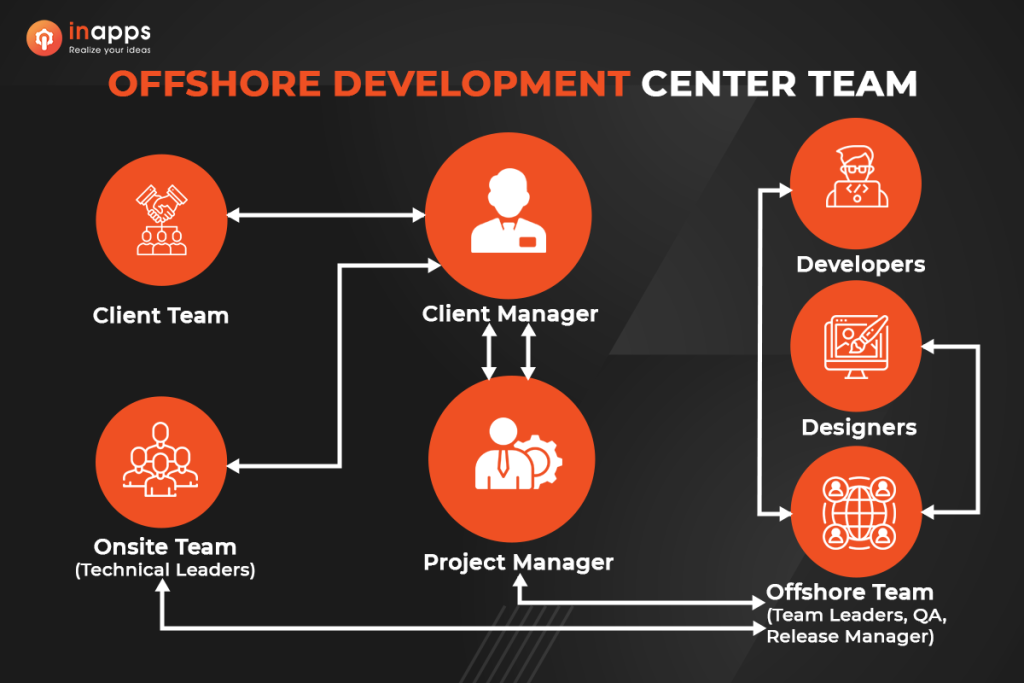
offshore development center team
| Project managers (PM) | Oversee project planning, execution, and communication, ensuring that objectives are met on time and within budget. |
| Team Lead | Coordinate the development team’s tasks, allocate work, and facilitate communication between team members and management. |
| Software engineers | Write code, develop software applications, and implement technical solutions based on project requirements. |
| Developers | Write code and implement specific features or functionalities within a software project, ensuring that the codebase is functional and efficient. |
| QA Experts | Design test cases, perform testing, report defects, and collaborate with developers to ensure software quality and compliance with standards. |
| UI/UX designers | Create visually appealing and user-friendly interfaces to enhance the overall user experience of the software. |
Any company can benefit from hiring an offshore development center, but companies in software, fintech, eCommerce and IT are usually top clients. One thing they have in common is that these companies have lower budgets for their IT project, but need scalable IT staff to handle their projects with special data security requirements. ODC’s business model is perfect for them as it allows companies to tap into the global talent pool with affordable costs.
2. Pros and cons of Offshore Development Center
Offshore development centers offer a range of advantages. Here are a few of them:
2.1 Benefits of ODC
Cost Savings: One of the primary advantages of ODCs is cost savings. By operating in regions with lower labor costs, organizations can significantly reduce their expenditure while maintaining the quality of work. This way, they can create high-quality products for less upfront investment.
Access to Global Talent: ODCs offer access to a diverse and skilled workforce, allowing companies to tap into talent that may be scarce in their home country. These regions, such as Asia, Eastern Europe, and Latin America are hot spots for skilled IT professionals. Hiring ODCs from these regions gives companies direct access to this global talent pool with specialized expertise.
Scalability: ODCs provide flexibility in scaling up or down based on project needs, since every offshore team has extensive experience in working alongside an in-house team. This high adaptability ensures that organizations can readily respond to changes in demand or project requirements.
Focus on Core Competencies: By delegating technical tasks to ODCs, companies can redirect their internal resources and focus on core business activities, such as strategy, innovation, and customer engagement.
2.2 Disadvantages of ODC
On the flip side, there are certain risks associated with hiring ODC that are worth considering.
Communication Challenges: One of the key challenges with ODCs is managing communication across different time zones and dealing with language barriers. Effective communication is crucial for successful collaboration.
Cultural Differences: ODCs in different countries may have varying work cultures and practices. These cultural differences can impact team dynamics and require careful management to ensure cohesion, according to Harvard Business Review.
Security Concerns: Data security and intellectual property protection can be a concern when working with ODCs, especially in regions with lax regulations. Organizations must implement stringent security measures to safeguard sensitive information.
Staff Turnover: that a team member is leaving the project for whatever reason is never good news. This means someone new will join the team, and the fear that this new person may not adapt quickly enough is always present.
Therefore, it is important to weigh up the pros and cons before the decision-making process. It is best to choose an ODC provider that will shield your business from these risks by offering solid guarantee policies. So you’ll know this is set for success.
3. Offshore development center services
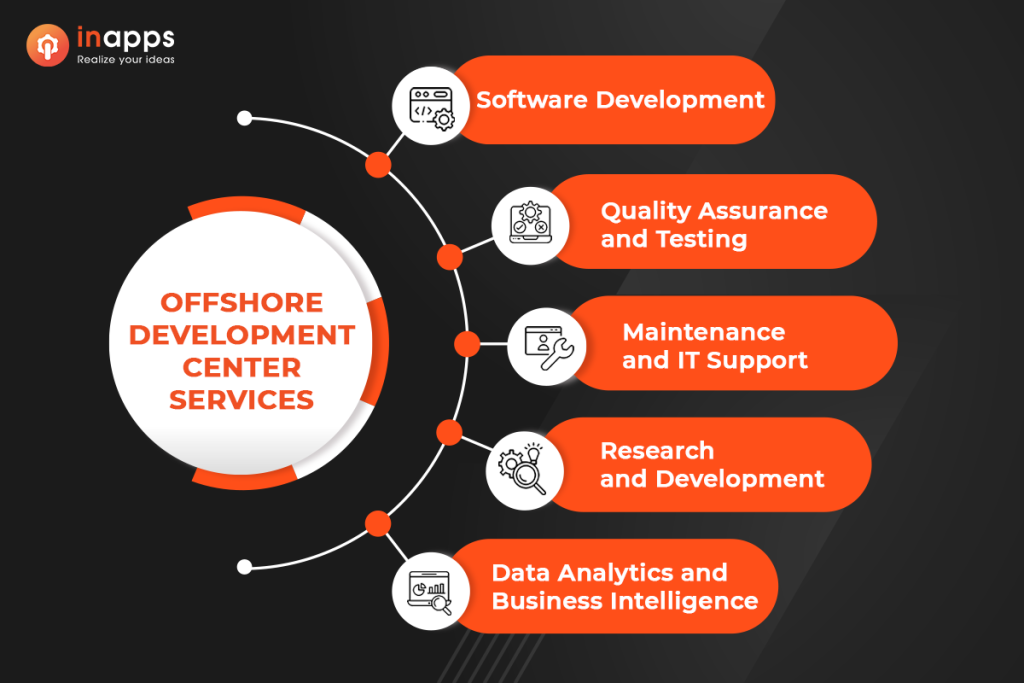
offshore development center services
ODCs offer a wide range of services tailored to meet the specific needs of their client organizations. These services encompass various aspects of IT and software development, including:
3.1 Software Development
ODCs are often engaged in custom software development, mobile and website application development, and product engineering. They play a pivotal role in bringing ideas to life through coding, testing, and deployment. If you’re looking to outsource your mobile or web app development to a trusted offshore team, strong portfolios are critical. This is why clients love outsourcing to InApps Technology.
If you want to get a clearer picture of how to outsource mobile app development successfully, here are two blogs that will intrigue you.
Read more:
A Detailed Guide to Outsourcing Mobile App Development Successfully in 2023 (Part I)
A Detailed Guide to Outsourcing Mobile App Development Successfully in 2023 (Part II)
3.2 Quality Assurance and Testing
Testing is a critical phase in the software development lifecycle. ODCs provide comprehensive quality assurance and testing services, manual testing, automated testing, and quality control to ensure software reliability and functionality.
3.3 Maintenance and IT Support
ODCs can handle ongoing maintenance, updates, and support for existing software applications. This ensures that the software remains up-to-date and continues to function smoothly.
3.4 Research and Development
Some organizations choose to utilize ODCs for research activities, innovation, and prototyping. ODCs can be instrumental in exploring new technologies and solutions to stay ahead of the competition.
3.5 Data Analytics and Business Intelligence
ODCs also provide data analysis, reporting, and business intelligence solutions. This helps organizations derive meaningful insights from their data to make informed decisions.
4. What is the ODC model of business?
When it comes to setting up an ODC, organizations have several models to choose from, each with its own set of advantages and considerations. Understanding the key differences between each model helps you choose the right one for your needs.
4.1 . Offshore Dedicated Team (also known as IT Staff Augmentation)
Organizations hire a dedicated offshore team with specific skill sets tailored to their needs, often managed by a third-party provider. This model is perfect for flexible projects with no specific initial requirements. The IT staff works as an extension of your in-house staff, so it is great for companies lacking in-house resources, but find it too risky to expand them in the meantime. Also, hiring IT staff is ideal when you only need extra help temporarily.
4.2 . Outsourced ODC
Alternatively, companies can opt for outsourcing their ODC needs to a third-party vendor. This vendor takes care of setting up and managing the ODC on behalf of the client company, relieving them of administrative and operational burdens. This model is great for companies with limited budgets and IT knowledge. However, they have to pay a fixed cost in advance, and there’s little room for flexibility in changing requests.
If you’re not clear on how IT staff augmentation differs from Outsourced ODC, let’s dive into this detailed comparison between IT staff and ODC.
4.3 . Build-Operate-Transfer (BOT)
The Build-Operate-Tranfer model is a hybrid approach. In this scenario, a third-party provider initially sets up and manages the ODC for a defined period. Afterward, control and ownership are gradually transferred to the client company. This transition period allows the client to gain experience and confidence in managing the offshore center independently. It is exactly what its name indicates!
5. How to set up the Offshore Development Center
Of course, establishing and managing an ODC requires careful planning and execution. But it is not as hard as you may think. Here is a breakdown of the key steps.
5.1 Choose the Right Location
It is important to select a location that aligns with your business objectives. Next, make sure you consider factors such as talent availability, cost advantages, political stability, and infrastructure.
5.2 Legal and Compliance
Ensuring compliance with local laws, regulations, and intellectual property protection is another thing to take into account. You can seek legal counsel to navigate the legal aspects of operating in a foreign jurisdiction.
5.3 Select the ODC Model
There are several ODC models available. It is best to determine which model is the best fit for your organization’s needs and resources.
5.4 Team Formation
When it comes to building a strong team, recruiting and onboarding both skilled technical and managerial professionals, who are well-versed in the local culture and work practices are critical.
5.5 Infrastructure and Technology
After a team is built, provide the necessary infrastructure, technology, and tools to enable efficient collaboration between the parent company and the ODC.
5.6 Communication and Collaboration
Then, it’s time to implement robust communication tools and strategies to bridge geographical gaps and foster effective collaboration between teams. In this category, one key element is choosing the suitable communication tools for your project and business. This will either make or break your collaboration, which will eventually contribute to the project outcome.
5.7 Project Management
This is where the project management is key. A project manager’s job involves using established project management methodologies and tools to coordinate work between the parent company and the ODC. This helps ensure alignment with project goals and timelines. Here are some effective tips to help you manage an offshore team: Best Strategies To Master Offshore Team Management
5.8 Data Security
Let’s not forget data security! It can be risky when an ODC provider uses your data for their execution. Therefore, establishing strict data security measures to protect sensitive information, including encryption, access controls, and regular security audits is a must. Also, choosing a trusted ODC will do you a big favor in the end.
5.9 Performance Monitoring
It’s now time to monitor and evaluate the ODC’s performance continuously. This can involve assessing key metrics and making necessary adjustments to optimize efficiency and productivity.
5.10 Cultural Sensitivity
Last but not least, you’re using international talents so that cultural barriers can happen. How to resolve this? Promoting cultural sensitivity within the organization and conducting team-building activities can help. This contributes to a positive working environment and strengthens team bonds. Follow 7 Tips to Embrace Cultural Differences with Offshore Teams and you can bridge those cultural gaps in no time.
6. In Summary
To sum up, Offshore Development Centers have become a valuable asset for organizations looking to cut costs, access global talent, and expand IT capabilities. While they offer numerous advantages, effective management and communication are essential for overcoming the challenges. By carefully planning and implementing the right strategies, organizations can leverage ODCs to thrive in an increasingly competitive global landscape.
I hope this article answers your questions on what is odc and what this outsourcing model has to offer to you. If you’re looking for the best offshore software development services, contact InApps Technology. We’re ranking 1st in Vietnam and 5th in Southeast Asia for Application Development on Clutch by getting great ratings and reviews from our clients. So, let’s connect!
Let’s create the next big thing together!
Coming together is a beginning. Keeping together is progress. Working together is success.







